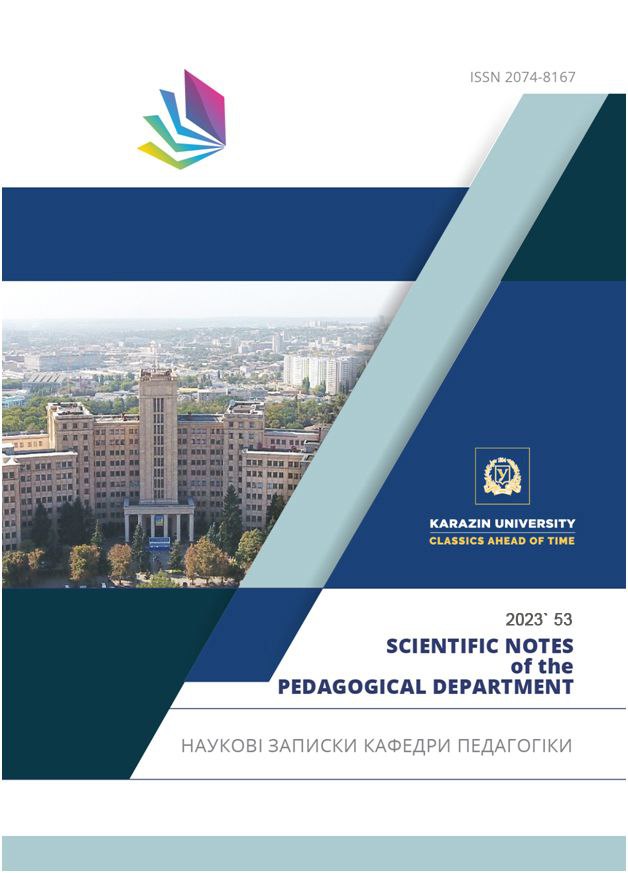Historical and pedagogical prerequisites for the development of academic giftedness in the People`s Republic of China
Abstract
Results of the research. The historical and pedagogical prerequisites for the development of academic giftedness in the People’s Republic of China can be conditionally divided into the following stages:
1. Ancient China (before 1911): the emergence of a system of examinations for civil service, which stimulated the development of education and the identification of gifted people; the development of Confucian philosophy, which emphasized the importance of education and self-improvement; creation of the first schools and academies for gifted children.
2. The Republican period (1911-1949): reforming the educational system, starting new types of schools and universities; introduction of new methods of education and training aimed at the development of creative thinking and independence; creation of the first programs for gifted children.
3. Modern period (since 1949): expansion of the network of schools for gifted children; development and implementation of new programs and methods of development of academic talent; creation of centers and institutes to support gifted children.
Downloads
References
/References
Antonova, O. E. (2005). Giftedness: experience of historical and comparative analysis: Monograph. Zhytomyr: Zhytomyr. state University.
Ievtukh, M. B. (2017). Giftedness: approaches to finding out the essence. Pedagogical almanac. 36. 10-19.
Naumenko, S. S. (2021). Origins of the idea of education and upbringing of gifted children in China. Theory and methodology of education and upbringing. 50. 136-143.
Naumenko, S. S. (2021). Pedagogical dimension of the concept of giftedness in the People’s Republic of China.
Scientific journal of the Black Sea Research Institute of Economics and Innovation. Series: “Innovative pedagogy”.
40–44.
Naumenko, S. S. (2021). Specialized educational institutions for gifted children of the People’s Republic of China.
Perepadia, D. O. (2013). Stimuli for the development of giftedness in children in China.
Poluboiaryna, I. I. (2020). Musical giftedness in the works of foreign researchers. Professional Art Education.
(1). 17–22.
Dai, D.Y. & Steenbergen-Hu S. (2015). Special class for the gifted young: A 34-year experimentation with early college entrance programs in China. Roeper Review. 37, 9–18.
Dai, D.Y., Steenbergen-Hu, S. & Yang, Y. (2016). Gifted education in Mainland China: How it serves a national interest and where it falls short. Gifted education in Asia: Problems and prospects. Charlotte NC. Information Age Publishing. 51–76.
Gong, H. & Lei, J. (2015). The progress and enlightenment of psychological researches on supernormal children.
A Journal of Modern Special Education. 4. 23–29.
Jia, Q. & Ericson D. P. (2017). Equity and access to higher education in China: Lessons from Hunan province for university admissions policy. International Journal of Educational Development. 52. 97-110.
Kitano, M. K. (2021). Issues in research on Asian American gifted students. Special Populations in Gifted Education. 3-25.
KPMG. Education in China. URL: https://www. kpmg.de/docs/Education-inChina-201011.pdf (дата звернення 06.01.2023).
Rimm, S. B., Siegle, D. & Davis, G. A. (2018). Education of the gifted and talented. Boston. 233-236.
Tran, H. N. et al. (2021). Principal Leadership and Teacher Professional Development in a Vietnamese High School for Gifted Students: Perspectives into Practice. European Journal of Educational Research. 10, 4. 1839- 1851.
Wang, J. & He J. (2013). Innovative perspectives and scientific nurturing of talents – a brief introduction to the gifted education of Beijing no.8 high school. Education of Innovative Talents. 28–31.
Zhang, B., Li, J. & Xu, C. (2014). The developmental differences of problem solving ability between intellectually- gifted and intellectually-average children aged from 11-14 years old. Acta Psychologica Sinica, 46. 1823–1834.
王德文. 中国职业教育体系. 中国网, 2014.
田雯.多元智力理论及其对我国教育的影响 (Doctoral dissertation, 华中师范大学), 2017.
联合国教科文组织. 学会生存.北京:教育科学出版社,2016.
荆楚网. 湖北实施五年制高职教育:初中毕业生可直接上大学. 中国新闻网, 2014.
Антонова О. Є. Обдарованість: досвід історичного та порівняльного аналізу: Монографія. Житомир: Житомир. держ. ун-т, 2005. 456 с.
Євтух М. Б. Обдарованість: підходи до з’ясування сутності. Педагогічний альманах. 2017. №. 36. С. 10–19.
Науменко С. С. Витоки ідеї навчання і виховання обдарованих дітей у Китаї. Теорія та методика навчання та виховання. 2021. №. 50. С. 136–143.
Науменко С. С. Педагогiчний вимiр поняття обдарованостi у КНР. Науковий журнал Причорноморського науково-дослiдного інститут економiки та iнновацiй. Серiя: «Iновацiйна педагогiка». 2021. Вип. 35. C. 40–44.
Науменко С. С. Спеціалізовані навчальні заклади для обдарованих дітей КНР. 2021. 126.
Перепадя Д. О. Стимули розвитку обдарованості дітей у Китаї. 2013. 136.
Полубоярина І. І. Музична обдарованість у працях зарубіжних дослідників. Professional Art Education. 2020. Vol. 1(1). Р. 17–22.
Dai D.Y., Steenbergen-Hu S. Special class for the gifted young: A 34-year experimentation with early college entrance programs in China. Roeper Review, 2015. № 37. P. 9–18.
Dai D.Y., Steenbergen-Hu S., Yang Y. Gifted education in Mainland China: How it serves a national interest and where it falls short. Gifted education in Asia: Problems and prospects. Charlotte NC: Information Age Publishing, 2016. P. 51–76.
Gong H., Lei J. The progress and enlightenment of psychological researches on supernormal children. A Journal of Modern Special Education, 2015. № 4. P. 23–29.
Jia Q., Ericson D. P. Equity and access to higher education in China: Lessons from Hunan province for university admissions policy. International Journal of Educational Development. 2017. Т. 52. С. 97–110.
Kitano M. K. Issues in research on Asian American gifted students. Special Populations in Gifted Education. Routledge, 2021. С. 3–25.
KPMG. Education in China. URL: https://www. kpmg.de/docs/Education-inChina-201011.pdf (дата звернення 06.01.2023).
Rimm S. B., Siegle D., Davis G. A. Education of the gifted and talented. – Boston, MA : Pearson, 2018. С. 233–236.
Tran H. N. et al. Principal Leadership and Teacher Professional Development in a Vietnamese High School for Gifted Students: Perspectives into Practice. European Journal of Educational Research. 2021. Т. 10. №. 4. С. 1839–1851.
Wang J., He J. Innovative perspectives and scientific nurturing of talents – a brief introduction to the gifted education of Beijing no.8 high school. Education of Innovative Talents, 2013. P. 28–31.
Zhang B., Li J., Xu C. The developmental differences of problem solving ability between intellectually-gifted and intellectually-average children aged from 11-14 years old. Acta Psychologica Sinica, 2014. № 46. P. 1823–1834.
王德文. 中国职业教育体系. 中国网, 2014.
田雯.多元智力理论及其对我国教育的影响 (Doctoral dissertation, 华中师范大学), 2017.
联合国教科文组织. 学会生存.北京:教育科学出版社,2016.
荆楚网. 湖北实施五年制高职教育:初中毕业生可直接上大学. 中国新闻网, 2014.

